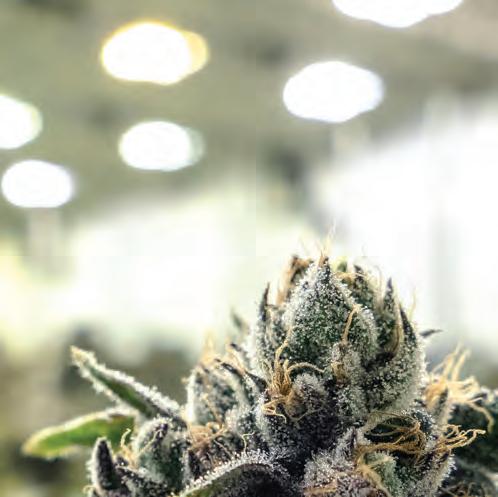OFFICIAL TRADE JOURNAL OF THE MICHIGAN CANNABIS INDUSTRY ASSOCIATION


OFFICIAL TRADE JOURNAL OF THE MICHIGAN CANNABIS INDUSTRY ASSOCIATION

Jerry Millen is on a mission at The Greenhouse of Walled Lake











 GREG SUDDERTH CEO & Lead Benefits Advisor
GREG SUDDERTH CEO & Lead Benefits Advisor
















Your Growing Business Every Step of the Way
















Strict regulations. Tax implications. Security procedures. Surging competition. It all requires a trusted partner with wide capabilities and a personal, customized approach. Our Cannabis Services Group brings a wealth of experience in cannabis, agribusiness, manufacturing and retail, making us uniquely qualified to help you navigate the complexities. Let us help you thrive.






We focus on the kind of growth that doesn’t come from a seed.
Focused on your next move. Cannabis. It’s complicated. It’s capital intense. And it’s highly regulated. To focus on growing your company, you need a financial partner who understands state requirements, compliance issues and the unique landscape of the industry. As longtime members of the MiCIA, Maner Costerisan’s team of experts helps dispensaries, processors, secure transporters and cultivators across the state achieve their goals.
We assist cannabis companies managing the complexities of running multiple entities and provide CFO-level expertise to those looking to develop or execute buy-sell strategies. Our tech experts integrate cloud-based accounting financial software with your current systems –including seed-to-sale software — providing you with a new level of customized, real-time data, so you can make more informed business decisions. We know how to turn America’s new cash crop into a long-term plan.

Talk To An Expert:


















» WORKPLACE VIOLENCE TRAINING
» ERGONOMICS ASSESSMENTS FOR WORKSTATIONS TO PREVENT REPETITIVE MOTION INJURIES
» ORIENTATION TRAINING DEVELOPMENT: INCLUDES SAFETY POLICY, RULES, HAZARDS, AND PROCEDURES FOR RESPONDING TO EMERGENCIES
» OSHA REQUIREMENTS AND REPORTING
» REVIEW OF SAFETY DATA SHEETS FOR CHEMICAL HAZARDS, APPROPRIATE CONTROLS AND EMERGENCY PROCEDURES
» RESPIRATORY PROTECTION AND PPE PROGRAMS AND ASSESSMENTS
» LOCK OUT, TAG OUT PROGRAM
» EYE PROTECTION, HEARING PROTECTION, ALLERGENS, WORKING WITH SHARP TOOLS, ETC.
» FORKLIFT TRAINING
» DEVELOPMENT OF EMERGENCY ACTION
» SITE RISK ASSESSMENTS FOR BIOLOGICAL, CHEMICAL, AND PHYSICAL HAZARDS
» MOLD, INDOOR AIR QUALITY, PESTICIDES, COMPRESSED GASES, ETC.
» DRIVER SAFETY AND TRAINING
» LEGALLY REVIEWED HUMAN RESOURCE PLATFORM


MICHIGAN CANNABIS INDUSTRY ASSOCIATION

Tgan cannabis industry.
2024 is shaping up to be yet another interesting, eventful year, and this issue of MiCIA Magazine covers some of the hot topics behind the buzz.
The federal rescheduling of cannabis is on the horizon, and we interviewed experts from the sciences (page 34) and from business (page 29) to get their thoughts on the implications of the plant’s pending move from Schedule I down to Schedule III. The path ahead is far from straightforward; as it turns out, rescheduling carries with it some significant unknowns.
As your industry advocate, we at the MiCIA want to be able to weigh in on important topics like this with authority, which is why we surround ourselves with experts. Consider our MiCIA Scientific Committee, which consists of specialists in chemistry, biology, medicine, and other fields. They are working together to explore and disseminate information on a variety of topics, including rescheduling. You can read more about some of the individuals on the committee on page 32.
Another expert we consulted for this issue is Rick Fanning, a senior counsel at international law firm Clark Hill, who specializes in labor and employment law. Turn to page 30 to get his take on some of the challenges that employers in the cannabis industry face, from classification of employees and overtime pay to workplace safety and union organization, as
ANDREW DRIVER CHAIR Driven Grow
MARK PASSERINI VICE CHAIR Om of Medicine
DAVE KRAMER TREASURER Driven Grow
RAYMOND ABRO JARS Cannabis
well as actionable tips.
Mixed in with these informative articles are
Mixed in with these informative articles are features on entrepreneurs who are powering our industry. Our cover star is Jerry Millen, owner of The Greenhouse of Walled Lake, who could lead a master class on creative community engagement. He was behind the headlinemaking “Pot for Shots” initiative during the COVID-19 pandemic; he co-sponsored a cannabis-themed wedding held at his dispensary; and he hosted a free concert with music star Jelly Roll in Greenhouse’s parking lot. He regularly pulls out all the stops to connect with the community at his shop and promote his “Greenhouse vs. Corporate Weed” mission. Turn to page 16 to read more.

Dana Elgie, owner of The Hive at BDT, is another pioneering entrepreneur whom we are pleased to feature this issue. At her microbusiness in Hazel Park, Dana prides herself on carrying thoughtfully curated products. Quality over quantity is more than a mantra at The Hive — it’s a commitment that permeates every inch of the operation. Read more about the boutique-style business starting on page 26.
As always, we encourage you to stay in touch with us at the MiCIA. Send any questions you have to info@micia.org. We are here to help!
101 S. Washington Square, Ste. 820 Lansing, MI 48933 micia.org
FOLLOW US AND LIKE US
MiCIA STAFF
ROBIN SCHNEIDER Executive Director robin@micia.org
KENZIE TERPSTRA Membership Coordinator kenzie@micia.org
MICHAEL J. PATTWELL Corporation Legal Counsel mpattwell@clarkhill.com
KEVIN MCKINNEY Lobbyist kevin@mckinneyandassociates.net For membership inquiries, email info@micia.org
PUBLISHING PARTNER
Robin Schneider, Executive DirectorJEVIN WEYENBERG Lake Effect
SAM USMAN PG Group
BOB MILLER ACT Laboratories
CALVIN JOHNSON Primitiv
JERRY MILLEN The Greenhouse of Walled Lake
NICK AGRO High Level Health
GEORGE LYNCH Green Stem and Simplicity Farms
MIKE DILAURA House of Dank
BOB LANDAAL Total Health Collective
SHORAN R. WILLIAMS Tend.Harvest.Cultivate.
GENERAL MANAGER Ed Peabody
MANAGING EDITOR Emily Doran
COPY EDITOR
Olivia Sedlacek
ASSOCIATE EDITOR
Jordan Jewell
ART DIRECTOR
Mike Wagester
PRODUCTION DIRECTOR
Jenine Knox
SENIOR PRODUCTION ARTIST
Stephanie Daniel
PRODUCTION ARTIST
Jonathan Boedecker
ADVERTISING ACCOUNT EXECUTIVES
Cynthia Barnhart, Karli Brown, Donna Kassab, Mary Pantely
ADVERTISING COORDINATOR Jonathan Boedecker
CONTRIBUTORS
Patrick Dunn, Rick Fanning, Kathy Gibbons, Eric Hobson, Jacky Hudson, Kevin McKinney, Wensdy Von Buskirk, Lauren Wethington, Brad Ziegler
MiCIA Magazine is published exclusively for the Michigan Cannabis Industry Association by Hour Custom Publishing, a division of Hour Media, LLC. Copyright ©2024. All rights reserved. No portion may be copied or published without the express written consent of the publisher. The views expressed in this publication are not necessarily those of the MiCIA or Hour Media.






















After the unusually long two-month break afforded to the Legislature because of an early, sine die adjournment on Nov. 14, Michigan’s senators and representatives reconvened on Jan. 10 to start the second year of this two-year session. 2024 does not promise to match the intensity and pace of 2023 as far as the tackling of significant, iconic issues. Having lost their slim working majority in the House, the Democrats now sit with a 54/54 split, although they still control the speaker’s office and committee chairs, which means they will continue to control the floor and committee agendas. January was terribly slow as the Legislature awaited the governor’s priorities included in her State of the State address given on Jan. 24. During that speech, the governor outlined her major policy and budget priorities in hopes of setting the direction for what is expected to be a politically tumultuous year.
The House will await the results of the two special elections coming up to fill the seats vacated by former state Reps. Kevin Coleman, D-Westland, and Lori Stone, D-Warren. Both districts lean heavily Democratic, but the special general election is not scheduled until April 16. That will mean the House Democratic caucus will not be back up to its full strength of 56 members until at least the third week in April. So, any legislative measures to be considered in the House will need to have a soft prerequisite of bipartisan support. There is no change in the Senate, so it will be clipping at a strong pace as it sends issues over to the House for later consideration.
Once the two special general elections are concluded, the Legislature will have approximately six weeks to complete work on the state budget for fiscal year 2025-26 prior to recessing for the summer.
In the upcoming November general election, the Michigan House will be up for reelection with majority control at stake, and there will be a number of competitive races in key congressional districts as well as open seats in both the 7th and 8th districts. In addition, there is the open U.S. Senate seat to consider, now that Sen. Debbie Stabenow has decided not to seek reelection.
To add a level of anxiety, the U.S. federal district court determined that 13 legislative districts drawn up by the Independent Citizens Redistricting Commission were unconstitutional. A couple of different versions for seven House districts were redrawn in and around Detroit by the Feb. 2 deadline to allow candidates to file their candidacy for the House by April 23. The impact on incumbents, potential candidates, and some neighboring communities that are currently in different House districts will depend on which maps are finally adopted. The Senate had six districts that
 Kevin McKinney
Kevin McKinney
needed changing, but since the senators are not up for reelection until 2026, the court has put this temporarily on pause in attempts to finish up the House districts.
The MiCIA has multiple policy discussions underway that will require significant work in the legislative process. First, discussions continue as to the feasibility of passing legislation to pause new licenses until the cannabis market stabilizes and the illicit activity taking place within the regulated industry is addressed with meaningful enforcement. There will need to be a strong consensus with all the stakeholders to garner the supermajority needed to pass the legislation and get it signed by the governor. In addition, the MiCIA has recently initiated discussions with key legislators to discuss the ongoing problem of intoxicating hemp-derived products being slipped into the regulated market. We are also urging lawmakers to pass a resolution in support of removing cannabis from Schedule I, which once adopted federally would resolve our members’ 280E liability.
Finally, we have the extensive proposed administrative rule set that will hopefully be ready for public comment later this spring. There are a number of remaining issues under internal consideration at the CRA, and it is uncertain where particular issues will end up.
There remain significant policy and political implications at play with all these matters, and there is no better way to provide your input than by directly engaging with your statewide trade association. The MiCIA is the collective and credible voice for the industry and has the attention and respect of policymakers. Keep in close touch with us at info@micia.org.
KevinMcKinneyistheleadlobbyistforthe MiCIA.





















The CRA’s online education sessions cover a wide range of topics
By Jacky HudsonThe Michigan Cannabis Regulatory Agency’s education sessions are an essential part of the agency’s public outreach. They serve as an extension of resources the CRA currently provides to both Social Equity Program participants and licensees as a whole.
Although offered through the CRA’s Social Equity Program, the education sessions are open to all and are well attended by viewers from all areas of the cannabis community. Each year, we are contacted by a wide range of companies and organizations wanting to bring current information to the audiences that join us every month and those who watch on our video channel after the fact as well. In addition to these external presenters, representatives from other Michigan agencies and internal CRA sections share their knowledge to promote
transparency and educate those who are navigating the cannabis industry.
Each session is intended to inform viewers about a topic that is important to licensees or potential applicants. These diverse topics range from banking, marketing, and technology to licensing, enforcement, and license types. In addition, each live session gives attendees direct access to the presenter so they can ask questions and receive real-time answers. These interactions are usually the best part of each presentation; viewers bring practical and complex concerns that move the conversation along and help expand the knowledge base of those who have tuned in.
Each session is recorded and is always available in the CRA’s video library at michigan.gov/cra/resources/video-library Live sessions are posted within a couple
of days of the presentation. We hosted 30 presentations in 2023, so there are plenty of topics to choose from.
Find out about upcoming sessions by visiting the CRA’s calendar of events (michigan.gov/cra/resources/agencyevent-page), following the CRA on social media, or signing up for email alerts at michigan.gov/cra (scroll to the bottom of the page to enter your email). There are no requirements for attending an education session, so log on and join the discussion and education happening in Michigan’s cannabis community.
Jacky Hudson is a departmental analyst in the Michigan Department of Licensing and Regulatory Affairs.


From seed to sale, the Rehmann team is here to help your business grow and thrive in one of the nation’s most competitive markets.
This year’s Michigan Cannabis CFO Outlook is now available to help cannabis licensees make empowered business decisions based on peer feedback. Download your copy today by using the QR code below.








Jerry Millen is on a mission at The Greenhouse of Walled Lake
BY WENSDY VON BUSKIRK // PHOTOS BY BRAD ZIEGLERWalking into The Greenhouse of Walled Lake, I’m greeted by Wanda, a friendly employee who checks my ID and then announces through a walkie-talkie that I’m here to see the owner, Jerry Millen.
As I wait in the vestibule, I see Millen on a large-screen TV that’s looping Greenhouse media spots. In one, he shows Fox 2 Detroit anchors Charlie Langton and Liz Lewin last-minute gift ideas for cannabis lovers. Boxer shorts with a pocket “to hold your nugs.” A wake-and-bake coffee mug that doubles as a pipe. Oven mitts with a five-pointed leaf print — “pot holders, no pun intended,” Millen quips.
At one point in the segment, Millen has a huge tray of doughnuts brought in. He and Liz take bites on camera.
“Speaking of baking,” Millen segues as he holds up a decarboxylator and explains how to make edibles at home. He shows Langton how to use a Flux hookah and displays a Starship vape that holds three cartridges at once.
He offers everyone watching a 50% discount on the featured products if they stop in that day.
The Fox 2 appearance was from the previous year, and during my visit, it’s Christmastime again. Carols play through speakers inside and outside the dispensary. Garlands wind around the store. At night, the entire facade of the building is lit in flashing red, green, and white. Millen goes big for the holidays. Any chance to make a bold statement and he’s there.

“I’m a small-business owner. I want to help keep the small guys in business. We busted our ass to make this legal.”
—Jerry Millen, The Greenhouse of Walled Lake
When I’m finally led upstairs for my interview, Millen sits at a big counter crammed into the attic of the dispensary, which was built in the late 1800s as a dry goods store. He is tall and rangy, with spiky gray hair and the voice of a broadcaster. He’s wearing cuffed jeans, Doc Martens, and a light blue Greenhouse-branded hoodie that matches his eyes, which dart around like the ideas that seem to percolate nonstop in his head.
On top of the counter, a collection of glassware is arranged for this year’s gift guide, and Millen is working on getting some press.
“I brought these back from MJBizCon,” he tells me, showing off bongs that look like Chinese takeout containers, Coleman lanterns, and red-and-white peppermint candies.
Millen is a master at getting attention, blending often outlandish publicity stunts with media savvy gleaned through years as a TV and radio personality and a mixed martial arts promoter.
He helped legalize cannabis in Michigan and now turns his talents toward promoting his own “mom-and-pop shop” against the forces at work in the cannabis industry today. His philosophy is captured in the shop’s slogan: Greenhouse vs. Corporate Weed.
The message is everywhere — emblazoned on merchandise, proclaimed across the company’s website, and painted in huge distressed lettering by local artist Mark Serra on the building’s brick facade, which rises above the traffic on Pontiac Trail. It harks back to the combative spirit of MMA and reflects the current battle Millen faces in defending his brand.
“I’m a small-business owner,” he says. “I want to help keep the small guys in business. We busted our ass to make this legal.”
Millen grew up in Wayne, Michigan, with dreams of a broadcasting career. He started in radio, on 89X and 96.3 FM, and then moved to TV as a sports director for UPN 50 and CBS 62 in the early 2000s. From
there, he scored work as an on-air reporter for E! News and Extra.
Then, a Japanese company, Pride Fighting Championships, recruited him to cover a mixed martial arts tournament. MMA was just emerging, and when Millen witnessed 90,000 spectators packing an outdoor soccer stadium in Tokyo, he realized he was onto something.
“I was blown away by the sport and thought, ‘This is going to be huge,’” he says. “I had covered the World Series and the Super Bowl but hadn’t seen anything like this.”
Millen took a job with the company and commuted to Japan, making an estimated 200 trips over a decade. From there, he went to work in Russia managing Fedor Emelianenko, widely hailed as one of the greatest heavyweight MMA fighters of all time.
The lifestyle expanded Millen’s horizons, but all the traveling took a toll.
“I loved the fight game, but I was traveling too much,” Millen says. “I started looking into cannabis.”
He wanted to spend more time with his twin daughters, now 16, and his son, now 19, and started looking into cannabis. He took classes, learned to grow and became a caregiver.
Always on the leading edge, Millen realized cannabis was on the cusp of going legit and becoming a huge business. He threw himself into the legalization campaign.
“I didn’t know much about it, but I put on my suit, went up to Lansing, and started meeting with politicians,” he says. “We needed to change the narrative.”
Collaborating with Robin Schneider, who was then with the National Patient Rights Association, Millen played a crucial role in passing legislation that established Michigan’s medical cannabis system. He also contributed to the success of Proposal 1, which legalized adult use after voters approved the measure in 2018.
At the same time, he set the stage to open his own dispensary.
“I planned ahead and took a risk,” he says. “I didn’t know if it would pay off.”


Pay off it did. The Greenhouse of Walled Lake was the first licensed adult-use retailer in Oakland County and now employs 30 to 40 staff and serves an estimated 1,600 customers a day.
Its success is due in large part to Millen’s big personality. In addition to producing high-quality videos and social media content of his own, Millen has a great instinct for making news. During the COVID-19 pandemic, he staged “Pot for Shots” and gave 40,000 free pre-rolls to customers who showed their vaccine cards. The effort was reported in national outlets from The New York Times to CNN.

“MSNBC came out and did three live shots,” he says. “It blew my mind.”
Millen partnered with Michigan’s Choice Laboratories to gift a cannabisthemed wedding valued at $40,000. He offered discounts to members of the United Auto Workers during the 2023 strike and donated to the organization’s food pantry. He’s been a big supporter of Girl Scouts, who have had plenty of success selling their cookies outside of his dispensary.
He even found a way to jump on the Popeyes fried chicken sandwich shortage. “I bought 500 sandwiches and gave them away,” Millen says. Customers lined up and down the street, and Channel 7 sent a
helicopter.
He hosted a free concert with Jelly Roll that drew thousands of fans to the Greenhouse parking lot after the country-rap artist blew up. He joined the Michigan Department of Transportation’s Adopt-aHighway program to get permanent signage on Interstate 96 in exchange for keeping the roadway clean.
Yes, Millen is good at theatrics, but at the heart of it all is a desire to give back.
“It’s great to do community stuff but piggyback and promote your business if you can,” he says.
Greenhouse contributed $10,000 to restore the Banks-Dolbeer Historic Home
in downtown Walled Lake, which served as a depot on the Underground Railroad. He sponsors the annual Walled Lake Fourth of July fireworks, contributes to an alternative high school, and does a dog rescue.
Greenhouse also donates to former Red Wings great Darren McCarty’s annual Charity Golf Outing, which benefits veterans through Operation Valhalla. Millen has hosted McCarty as a guest budtender, during which McCarty signed autographs and promoted his cannabis line.
McCarty says he met Millen in the mid-’90s doing shows on 97.1 The Ticket and is a fan of Greenhouse.


“I want people to know you can go in there, and whatever you ask, there’s no dumb question,” McCarty says. “To know that’s where I go, so it’s safe.”
As Millen looks to the future, he hopes to open a second location in Livingston County eventually. He bought a building in downtown Brighton, but efforts there stalled when residents voted against allowing cannabis sales.
For now, he’s focused on Walled Lake. At the end of our interview, as he ushers me back through the dispensary, he interacts with staff and customers along the way.
“I like to connect with people,” he says.
We pass a woman with a cane and then a man with a guide dog, who reflect the shop’s focus on older adults, patients, and veterans.
Millen’s average customer is 44, and he shows me antiques he tracks down to appeal to his older demographic and give the dispensary a homey, nostalgic vibe: a glass display case

from the 1800s, an array of old Michigan license plates, a cigarette vending machine from the 1940s now filled with packs of pre-rolls.
He wants people to feel welcome, comfortable. That’s why he hires older adults to staff the door instead of the armed guards you might find at other dispensaries.
On my way out, Millen hands me a T-shirt that says “Support Your Local Farmer.” I smile at the graphic of Farmer Jack, a logo I recognize from the Detroit-based grocery store chain where I used to shop as a kid.
Wanda says goodbye as I leave, and I take in the view of the water from the shore of Walled Lake before hopping in my car. The last thing I see as I’m driving away is the huge billboard: Greenhouse vs. Corporate Weed.






•Create
•Ease
•Save
•Put







As Jim Conner tells it, MJ Verdant’s partnership with Jelly Roll was basically the result of “dumb luck.”
“It’s kind of one of those age-old things where you know a guy that knows a guy that knows a guy,” laughs the CEO and founder of the Muskegon-based cultivation company.
Three years ago, the MJ Verdant team began conversations with the rapper/singer that have led to its producing three strains
of flower and a resin-infused pre-roll under the celebrity’s Bad Apple cannabis brand for distribution in Michigan. The product line is now available at multiple retail outlets in the state.
Whether by chance or by strategic planning, multiple cannabis companies in the state have formed collaborations with well-known names that range from Jim Belushi and Willie Nelson to Cheech Marin and the late Bob Marley’s son Rohan. Not only do these
partnerships help the companies’ bottom line, but they also give them a certain cachet that can be hard to put a price on.
“The reason anybody wants a celebrity endorsement is they have followers. People listen to him,” Conner says of Jelly Roll. “His fan base tends to be cannabis users, … so if he’s endorsing it, they’re going to try it. That’s a simple fact.
“And it gets us notoriety for our brand by association. Obviously, if I’m growing some-

thing Jelly Roll puts his name on, [people want to know,] ‘What else does MJ Verdant grow?’ So there’s that mutual benefit for us.”
Conner says Jelly Roll wasn’t as well known when they began discussing how they could work together. “He definitely wasn’t the megastar he is now,” Conner says. “At that stage, it seemed like a really good idea — he could make some money, we could do some things, we could get our brand out there, get better exposure for us as well as develop a brand for him.”
Narrowing down the strains that Jelly Roll wanted wasn’t a short process. “That takes a long time,” Conner says. “Most people don’t understand, if you launch a new strain, you come up with a new seed, and you’re going to test it a couple times; it will take nine months. It takes time to pick something and be able to run with it.”
Bad Apple’s Cherry Roll was appealing to Jelly Roll because it gave him energy and fueled creativity, Conner says. The other two

strains — Sweet Comfort and Butterface — are smooth and designed to aid relaxation.
Jelly Roll came to Michigan to help promote the products’ launch last May. Conner says the star’s schedule is pretty crazy these days, so he’s not as available to be involved as he was earlier on. But Conner says it’s been good for his company to be along for the ride.
“It’s been fun for us to watch, especially that I got to know him a little bit,” Conner says. “He’s a pretty humble and easygoing guy.”
Similarly, it took a while for Highway Horticulture to develop the products it now produces for Jim Belushi’s cannabis brand, The Blues Brothers. Highway Horticulture has a 20,000-square-foot facility in Cassopolis, where it grows strains specific to Belushi to make his brand’s flower, pre-rolls, infused pre-rolls, and brick hash for sale in Michigan. The products are processed at Highway Horticulture Productions in Marshall and sell at
about 100 dispensaries around the state.
Nick Sayers, co-founder of Highway Horticulture and the company’s Sunset Coast Provisions retail operation in Cassopolis, officially met Belushi through another brand partner in 2021. He had started Highway Horticulture in 2020, and Belushi was looking to enter the Michigan cannabis market.
“We are his Michigan partner,” Sayers says. “We first started harvesting right at the end of last year [2022]. We were still kind of building up inventory and really didn’t have that in stride until this summer [2023].”
Meanwhile, Belushi’s cannabis profile was getting a big boost from the Discovery Channel series Growing Belushi, which follows the actor and his cannabis farm in southern Oregon.
“What we’ve found is a very rabid, well-educated, loyal group of fans that love the Belushi brand and the quality of the flower, and that’s been important for us as a partner to Jim,” Sayers says.
The Blues Brothers is one of several brands Highway is producing out of Marshall.









“It’s not a majority of our production by any means, but it does garner a premium. … We’re matching high-quality flower with a high-quality celebrity brand,” Sayers says. “Both of those factors make it easier for the retailers to sell to the customers.”
Highway Horticulture has its own brands: Back Roads, InnerState, and Rush Hour. The company also partners with others, including 1906 tablets; Michigan-based Midnight Roots; and cannabis beverage producers Uncle Arnie’s, Keef, and Happi, for which Highway has implemented “one of the largest canning
and bottling operations in cannabis,” Sayers says. A Midnight Roots–Belushi collaboration on a chocolate bar is in the works as well, he says.
“It’s exciting for us because we’re seeing synergies among partners in our brand portfolio,” Sayers says. “We’re bringing everybody together to help everybody.”
Both 305 Farms in Lawrence and its sales and marketing support arm 305 Brands are incubated startups of the The Verleur Group, a Miami-based venture capital firm. Founding partner Jan Verleur is also an owner of Lion Order, another TVG startup established by Rohan Marley, son of the late reggae musician and activist Bob Marley. The TVG connection is what brought 305 Farms — with its cultivation and manufacturing facilities — and Lion Order together.
305 Farms produces four product lines: its own Workers Cannabis, the 305 Farms brand, Lion Order, and the recently launched value-oriented brand TableWeed.
Verleur estimates that about one-third of 305 Farms’ revenue and production is in the Lion Order segment of the business. The relationship works because the Marleys “epitomize” cannabis, Verleur says. “I can’t imagine any celebrity that’s more applicable,” he says. “[Rohan’s] just such a great
personality, and his vision is very clear as to what he wants to do.”
Lion Order launched in Michigan first, starting out small in 2022 — just as 305 Farms itself was getting up and running — and picking up steam in 2023.
“We had tons of excess capacity as we launched [305 Farms],” Verleur says. “It was perfect timing to integrate Lion Order because we had the capacity and the vibe was fantastic.”
Verleur says licenses to produce and sell Lion Order in Ohio and Massachusetts are coming, and five other states are in negotiation. Meanwhile, the “huge infrastructure” that 305 Farms has created in Michigan is also serving as training support for those who will be involved in the other states.
At press time, Lion Order in Michigan had six cannabis strains (and three more in the works). The brand, which Verleur notes is carried at nearly 150 dispensaries, includes flower, pre-rolls, and vapes. “If I had to predict for 2024, Lion Order might represent about 40% of our business,” Verleur says.
Over in Lansing, a collaboration between Sam Usman Jr.’s cultivation and retail companies — Pro Gro and Pure Options, respectively — and Southfield-born DJ, songwriter, and music producer GRiZ came down to one thing: compatibility.
“It’s always fun to work with like-minded individuals that have achieved a certain level of success and pride in what they do,” Usman says.
Usman connected with GRiZ, aka Grant Kwiecinski, through the celebrity’s brother, who had worked with Usman over the years. Before they became partners, Usman flew to Colorado to meet the artist and determined they had the right rapport to collaborate on Kwiecinski’s cannabis brand.
“He was really excited about the opportunity in the industry,” Usman says. “We created a collaboration that made sense for both of us.”
Usman worked with a variety of breeders to select cannabis options for GRiZ and his team to review. “They picked the strains they liked the most, and that’s what we grew for the brand,” Usman says.
Usman’s company produced the THCbased Astro Hippie flower product line for GRiZ in Michigan.
“It wasn’t necessarily to supply the masses,” Usman says. “It was more like a craft boutique distribution model.”
Aardvark Industrees of Lansing has developed associations with two big names and expects to announce a third in 2024. Sales manager Hilary Dulany says Aardvark first connected with Cheech Marin of Cheech and Chong fame to produce flower for the Cheech’s Stash brand in Michigan, rolling the line out in 2022. Sales were so brisk that Aardvark exceeded its capacity and the company turned to several small growers to keep up with demand, though Dulany notes her company is in the process of adding more grow space. Aardvark distributes to approximately 30 outlets around Michigan.
In 2023, Aardvark began the process of becoming the licensor for Willie Nelson’s Willie’s Reserve in Michigan. The company’s willingness to work with small growers “resonated” with Nelson’s team, Dulany explains.
“He supports family farms,” she says. “We work with small operators. … If a market condition changes, they can adjust quickly. We produce some ourselves, but we’re also sourcing some of the best flower from some of the best growers around the state and giving them credit for it and paying what we charge for our own flower.”
Next up is a partnership with another big name for new edibles products. “We’re in the process right now of building a commercial kitchen for the edibles line we’re rolling out in the spring,” Dulany says. “I can’t say right now who it is.”
Dulany estimates that between 60% and 75% of Aardvark’s output has been associated with celebrities. In the end, though, she says that any brand — celebrity or otherwise — is only as good as the product.
“It really only gets your foot in the door once,” she says. “The product that’s in the bag is what matters after, and the service you provide not only to the end consumer but to the retailer from a wholesale perspective. That’s what’s really important.”




The woman-owned microbusiness encourages customers to embrace quality over quantityBY LAUREN WETHINGTON
For 50 years, BDT Smoke Shop in Hazel Park offered the area’s cannabis enthusiasts almost everything they needed to toke up, from rolling papers and glassware to grinders and vaporizers. The only thing they didn’t have: cannabis.
That changed in June 2023 when Dana Elgie, daughter of BDT Smoke Shop owner Curtis Goure, opened The Hive at BDT, one of metro Detroit’s first cannabis microbusinesses. The Hive carries an exclusive, award-winning line of infused cannabis flower, along with a curated selection of edibles, topicals, concentrates, and other products. The microbusiness



also plans to begin selling its own flower, grown and cured in-house by Elgie and her team, in the spring.
that come in and know us all by name,” Elgie says. “It’s a very small, tight-knit community.”





The shop touts itself as a boutique-style cannabis dispensary for customers exhausted by the impersonal, big-box experience and seemingly endless product lists offered by many larger dispensaries in the area. Located within the same building as BDT, The Hive is cozy, welcoming, and softly lit. A single wraparound glass case displays a small but unique collection of products, while a friendly face — often that of Elgie herself — waits behind the counter to offer assistance.

“We have so many people
Elgie is no newcomer to the cannabis industry. She became a caregiver in 2009 after Michigan passed legislation allowing the cultivation and use of medical marijuana. She began a small grow operation, making edibles and tinctures to help friends and family members treat stubborn ailments ranging from chronic pain to anxiety.
The positive feedback from her patients was all the confirmation Elgie needed that the cannabis industry was the right fit for her.


“I would not put anything in the store that I wouldn’t use myself.”
—Dana Elgie, The Hive at BDT

“I was giving [cannabis products] to my grandma’s friends and all my friends’ moms — people that you would never expect to reach out to you for help,” she says. “That was a super eye-opening experience for me.”
After Michigan voters approved adultuse cannabis in 2018, Elgie decided it was time to scale up her business. She had launched Bumblebee Gas and Extraction Supply, which sells solvents, dry ice, consumables, and other supplies to folks looking to make their own extractions, earlier that same year. With support from her father, she began arranging the launch of The Hive, but plans were put on hold when BDT experienced a particularly slow sales period in 2019 and the early part of 2020.
Things changed for the business after COVID-19 hit hard in March of 2020.
“The smoke shop started doing really well during COVID,” Elgie says. “People had time off, or they were working from home
and had more time to shop. So we got a boost in business, and we were like, ‘Do we open [The Hive] while something like COVID is happening?’”
The process of building and launching The Hive during the pandemic was excruciatingly slow, Elgie recalls. Building materials were expensive and difficult to procure, and every process seemed to take even longer than the one before it. But the slowdown ended up being a blessing in disguise, as the state introduced another type of cannabis microbusiness license: the Microbusiness A license.
In contrast to Michigan’s classic marijuana microbusiness license, which stipulates that every product sold must be grown and processed in-house (from a maximum of 150 plants), the Microbusiness A license allows for the cultivation of up to 300 cannabis plants and the purchase of concen-
trate and marijuana-infused products from licensed processors.
The Hive’s director of operations, Carly Gilewski, calls the license “the best of both worlds.”
“With a [cannabis microbusiness] license, everything has to be done in-house, which gives you no opportunity to stock familiar products people know,” Gilewski says. “With a [Microbusiness A license], we can at least get customers in the door who are looking for a product they know. Then maybe they end up also leaving with something that’s ours. But we’ve got to get them in the door first.”
The Microbusiness A license type also allowed The Hive to launch what is currently its flagship product: infused flower. For this product, Elgie and Gilewski carefully source top-quality cannabis flower from growers with roots in the caregiving
industry. The harvested flower is then sent for custom infusing at either Society C or Freight Train Canna, where it is infused with solventless rosin or kief and live resin. The result is a high-THC flower rich in multiple types of cannabinoids.
The Hive’s line of infused flower isn’t just good — it’s the best in the area, according to Detroit Metro Times’ 2023 “Best of Detroit” awards.
“It was such a tough decision for us to open our doors before we had our own [grown in-house] flower,” Gilewski says. “Our biggest pride in everything is to say that we have small-batch, fresh flower. But that’s still true, because this is something that [Society C and Freight Train Canna] aren’t doing for any other retailers.”
As notable as it is for the product it does offer, The Hive also stands apart for what it doesn’t carry, Elgie says: no pre-packaged flower and no low-quality concentrates. The selection may be small, she explains, but it’s curated; every product is one she and Gilewski know and love.
“I would not put anything in the store that I wouldn’t use myself,” Elgie says.
“We have so many people that come in and know us all by name. It’s a very small, tightknit community.”
—Dana Elgie, The Hive at BDT
Behind The Hive’s retail space lies a series of grow rooms, and although they were empty in late autumn, Elgie and Gilewski hope to have them full of plants by spring. Once the plants are mature, staff at The Hive will be able to harvest, cure, and sell the fresh product right on-site.
Elgie and Gilewski are also hoping to open a consumption lounge in the first half of 2024. Although it won’t be located at BDT — the pair have secured a space just one block south, in the same plaza as My Town Market — the lounge will offer a full

menu from The Hive available for delivery.
Other details are still in flux.
“We’ve just gone back and forth on how to monetize something like [a consumption lounge],” Elgie says. “Do we want an arcade? Do we want a place where people can eat pizza and wings? That’s something we’re struggling with. But it’s coming soon.”
As leaders of one of the few cannabis businesses owned and run by women in
metro Detroit, Elgie and Gilewski say they hope to see more women jump into the industry.
“In this industry, a lot of women are treated like we don’t know anything just because we’re women,” Gilewski says. “Don’t let someone put you in a box or make you feel like you can’t do something. Just be confident in your knowledge and let that shine through.”
2024 will be an interesting year for the cannabis industry.
So says Chris Rosmarin, head of the cannabis practice for Rehmann, a multistate professional advisory firm, which released its 2023 Michigan Cannabis CFO Outlook report late last year. The report gives a snapshot of the state of the industry by diving into the results of a survey made available to all of Michigan’s licensed cannabis operations last summer. 2023 was the second year Rehmann conducted such a survey and released a corresponding report.
Although many of the 2023 report’s findings weren’t particularly surprising to Rosmarin — and “one of the biggest findings [was] that there wasn’t as much change” as he had anticipated — he expects to see some big activity statewide and nationally this year and next.
First, he anticipates that mergers and acquisitions will (finally) heat up this year.
“With unlimited licenses, you would expect [there] should be a lot more consolidation — the strong surviving and the weak selling out,” Rosmarin says. “We haven’t seen much of that.”
According to the report, 39% of survey respondents were either “very likely” or “somewhat likely” to close on an acquisition in the next year. At the same time, 34% said they were considering or were in the process of selling their business. In 2022, those numbers were 61% and 39%, respectively.
Now that pricing and cash flows are becoming more predictable, though, Rosmarin says, he expects mergers and acquisitions to start taking off.
Still, he notes that “a lot of companies aren’t paying their taxes,” which can be a big deterrent to potential M&A activity.
“No one wants to buy a company who hasn’t paid their taxes,” Rosmarin says, “and those are going to be the companies that are more desperate to sell, too, because they want the cash to pay their taxes.” On the flip side, he says, “a company
that is current on their obligations, they’ll be more valuable, especially if they want to sell to someone else.”
Another area where some businesses are lagging is social equity. Roughly 35% of survey respondents reported being noncompliant, partially compliant, or unsure of their compliance with their social equity plan.
“I think some of those who aren’t [compliant] are just feeling that they’re free from enforcement,” Rosmarin says. “I can’t think of anyone who has lost their license because they haven’t complied with the social equity plan requirements for a municipality or for the state.”
A higher percentage of survey respondents in 2023 (41%) than in 2022 (28%) did report having undergone some level of state,
federal, or reporting audits. “I was surprised with the extent of that,” Rosmarin says.
On the national stage, Rosmarin anticipates that cannabis will indeed be rescheduled in the near future, which would have enormous financial implications for the industry.
“The biggest benefit is 280E, the tax provision that taxes gross profits, kind of goes away,” he says. “That makes companies more profitable; that means they keep more of the cash that they earn, and that gives them [the] ability to spend more of that cash on their … investments, … distributions to their owners, however they see fit.”
One dramatic change in the 2023 report was survey respondents’ attitudes toward the Cannabis Regulatory Agency. Fortyseven percent of respondents, up from 25% in 2022, said they thought the CRA was regulating the industry very effectively or at least satisfactorily.
“I’ve heard from our clients that they do feel like the CRA is doing a good job in catching the bad guys, being more of an enforcement agency than a compliance agency,” Rosmarin says.







He also points to the survey results about cultivators’ absorbed cost per pound as highly sought-after information. Almost 55% of growers who responded reported being in the $501 to $750 range.
“I would be hyperfocused on this stat if I was a CFO,” Rosmarin says, “because this is half of the battle for a grower — keeping your costs down and improving your yields.”
Looking further ahead to 2025, Rosmarin predicts that some stores on the border of Ohio will struggle once Ohio’s adult-use market is up and running. Voters in the Buckeye State kick-started that process in November 2023 by approving a statewide ballot measure to legalize recreational cannabis.
“Some of the larger players will be OK with it,” Rosmarin says, but the Michigan stores that are dependent on sales to their southern neighbors will be impacted.









Protect your business and build a better workplace by prioritizing compliance
By Rick Fanning
Cannabis businesses rely on their people. Whether you are a grower or a producer, operate a dispensary, or provide auxiliary services to the industry, your organization needs people to get the work done. Leading a great team is extraordinarily rewarding but requires compliance with labor and employment laws. Of course, cannabis businesses want to avoid costly litigation and payments resulting from employee issues. Additionally, compliance with these laws also promotes a positive work environment where employees are treated fairly and equally.
This article will highlight some of the common labor and employment law challenges facing the cannabis industry. It will also offer a few practical steps to help reduce risk and become a better employer.
Cannabis businesses should consider whether they are correctly classifying their workers as independent contractors or employees. Problems arise when businesses incorrectly classify employees as independent contractors. Employers can face claims from the impacted employees
and enforcement actions from governmental agencies. Employers may be required to pay back wages, taxes, and missed overtime, as well as provide other remedies. The legal distinction between an employee and a contractor often concerns who has control over the time, place, and manner of the work. The existence, or absence, of a written contract and the duration of the relationship will also be considered, as will the ability of the worker to make a profit. Ultimately, a business that is controlling the time, place, and manner of the work may be dealing with an employee and not a contractor.
Both the federal Fair Labor Standards Act, 29 U.S.C. §201 et seq., and Michigan law, MCL §408.934a, require employers to pay overtime (at 1.5 times the regular hourly rate) to many employees if they work more than 40 hours a week. Employers need to pay careful attention to the hourly rate they are using to calculate overtime, especially when the employee works in different roles with different pay rates during the week, or if certain bonuses are paid during a given workweek. There are limited exceptions and exemptions for specific kinds of employees.
To qualify for the exemptions, employees must perform certain kinds of duties and must be paid a salary above an established minimum.
Like all good employers, cannabis businesses are concerned with employee safety. In addition to being a good employment practice, compliance with workplace safety rules is a vital step in protecting the business from liability. The Michigan Occupational Safety and Health Administration maintains detailed rules and regulations covering workplace safety. In 2023, MIOSHA announced a state emphasis program that “covers the growing, harvesting, and processing of cannabis.” MIOSHA noted these areas “have the highest occurrence of occupational safety and health hazards.” More information can be found on the MIOSHA website at michigan.gov/leo/ bureaus-agencies/miosha/about-miosha/ strategic-plan-and-initiatives/cannabis.
4. Claims of Discrimination, Harassment, and Retaliation
An employer may be liable for employee claims that an adverse employment action
or workplace harassment was due to that employee’s membership in a protected classification. Michigan law recognizes the following protected classifications: religion, race, color, national origin, age, sex, height, weight, marital status, and disability. MCL §37.1101 et seq., §37.2202. Effective Feb. 13, 2024, this list will include sexual orientation and gender identity or expression. Federal law provides a similar list of protected classifications. 42 U.S.C. §2000e-2 et seq., 42 U.S.C. §12101 et seq. Michigan Public Act 45 of 2023 specifies that “race” includes “traits historically associated with race, including, but not limited to, hair texture and protective hairstyles.” State and federal law also identify pregnancy as a protected classification. Employees can also allege workplace retaliation for protected activity such as whistleblowing, promoting unionization in the workplace, or resisting discrimination or harassment. Employers can face investigations from governmental agencies such as the U.S. Equal Employment Opportunity Commission and the Michigan Department of Civil Rights, as well as claims by individual employees. Employers can often defeat these claims by showing they treated employees equally under their employment policies and by showing legitimate business reasons for their actions.
5. Accommodations for Employees with Disabilities
Both the Michigan Persons with Disabilities Civil Rights Act, MCL §37.1101 et seq., and the federal Americans with Disabilities Act, 42 U.S.C. §12101 et seq., require employers to offer reasonable accommodations to qualified individuals with disabilities, unless doing so would be an undue hardship for the employer. Employers need to engage employees in an “interactive process” to try to identify a reasonable accommodation.
6. Employee Leave and Paid Time Off
Employers with 50 or more employees may be subject to the
Family and Medical Leave Act, 29 U.S.C. §2601 et seq., which allows eligible employees unpaid leave for a number of reasons, including a serious health condition of the employee or an eligible family member. Michigan’s Paid Medical Leave Act also requires employers with 50 or more employees to offer at least one hour of paid medical leave for every 35 hours worked. There are a number of tests that must be met for an employee to be eligible, including that the employee worked, on average, 25 hours or more per week during the immediately preceding calendar year. MCL §408.961 et seq. The specifics of this act are also subject to a case pending before the Michigan Supreme Court.
After years of decline, private sector union organizing has increased in recent years. The cannabis industry has also seen union organizing and the consequences of mishandling union-related matters. For example, the National Labor Relations Board recently announced a settlement with a Missouri cannabis dispensary arising from a unionization effort. The settlement required the dispensary to recognize the union, reinstate five terminated employees, and pay $145,000 in back pay Point Management, LLC, d/b/a Shangri-La, Case No. 14-CA324836.

Employees have significant rights under the National Labor Relations Act, including the right to form a union free from what is legally defined as “coercion” by an employer. For example, employees often have the ability to discuss unionization during nonworking time and to distribute literature in nonworking areas during nonworking time. Subject to some exceptions, employees may wear union-related clothing and buttons. The NLRB recently revised rules to expedite the organizational process and issued decisions addressing employer work rules and policies.
So, what is an employer to do? Here are a few practical suggestions that will help address some of these issues:
• Maintain a well-considered employee handbook. A good employee handbook establishes rules that govern your relationship with employees and helps ensure that they are treated consistently and fairly. One word of caution: While there are many model handbooks available, you need to make sure that your handbook is customized for your business.
• Train managers and supervisors. Managers and supervisors should reflect the values of the organization when they interact with employees. A business can be liable when supervisors and managers say the wrong thing or act improperly, even when they are just making honest mistakes. You should invest in these leaders and provide the training they need to comply with labor and employment laws. You should also hold managers and supervisors (as well as other employees) accountable for any discriminatory or harassing comments or actions.
• Create and promote a culture of compliance. Employment and labor laws and regulations should be seen as an opportunity to make sure that your workplace is safe and free from discrimination and harassment. Encourage your leadership team to see these requirements as a way to build a better workplace.
• Reach out if you need help. Experienced professionals can help customize an employee handbook, provide training for supervisors, and provide crucial advice when problems arise or when a cannabis employer believes union organizing is ongoing. We have significant experience in these matters and enjoy working through these issues with employers.
RickFanningisaseniorcounselatinternational law firm Clark Hill. He is based in theDetroitofficeandspecializes in labor and employmentlaw.Fanningcanbereachedat rfanning@clarkhill.com.
The group focuses on cannabis research and education
By Jordan JewellThe MiCIA Scientific Committee is made up of professionals in medicine, chemistry, biology, and other disciplines. Together, they are working on cannabis research and education on behalf of the MiCIA. Meet some of the members here.

EVANGELOS LITINAS, M.D.
Owner of Dr. Evan’s Herbal Solutions
After receiving his medical degree in 2007 and his MBA in 2010, Dr. Evangelos Litinas left his job in hospital revenue consulting to devote his time to educating others about the therapeutic potential of cannabis. He has worked as the chief medical officer at a Michigan dispensary and has been involved in medical cannabis research. He owns Dr. Evan’s Herbal Solutions, a cannabinoid-based product brand. Litinas spearheaded the formation of the Scientific Committee last year.
“My goal is to provide our members and MiCIA with scientifically valid information on a variety of subjects that affect our day-to-day businesses and the industry.”

CASSIN COLEMAN
Founder of Cassin Consulting Mentor with the Detroit Cannabis Project
After studying organic chemistry at the University of Missouri Kansas City, Cassin Coleman began a career in pharmaceuticals on the clinical and generic development side of things before joining the world of cannabis in 2013. Their entry into the industry stemmed from their wife’s use of the plant to treat her multiple sclerosis. As a member of the Scientific Committee, Coleman enjoys combining their love for all things science with the ins and outs of policy.
 BOB MILLER, PH.D.
Chief Scientific Officer for
BOB MILLER, PH.D.
Chief Scientific Officer for
ACT Laboratories
Over the course of five years, Miller has served as the chief operating officer, co-CEO, and now chief scientific officer at Lansing-based ACT Laboratories. Prior to joining ACT Lab, he served as head of quality at major pharmaceutical companies such as Gilead Sciences, Johnson & Johnson, and Pfizer.
As a member of the Scientific Committee, Miller has been able to provide the group with a technical perspective related to lab testing.
“Our goal is to expand patient education and awareness of the testing that is required for cannabis products in order for them to make an informed buying decision.”

MICHAEL ZSIGO Co-Founder of StrainSeekr
Michael Zsigo was originally following a career path in finance when a mixture of curiosity and passion to help others drove him to the cannabis industry, where he got his start as a budtender. He has since co-founded StrainSeekr, a software tool to help budtenders make personalized product recommendations to dispensary shoppers. As a member of the Scientific Committee, the Michigan native works to ensure that the industry continues to prioritize compassion over profit margin.
“2024 will ideally be the year of the fully informed customer. It’s my mission to be sure that customers have access to the information that they need to make informed decisions, keeping in mind that THC percentage is not the primary determinant of quality.”

“The MiCIA Scientific Committee provides the opportunity for industry leaders with a scientific leaning to vocalize issues and seek input from other experts.”
—David J. Nelson

DAVID J. NELSON
Research and Development Manager at 42 Degrees Processing
Prior to joining 42 Degrees Processing in Kalkaska as a chemist, David J. Nelson worked at different points as a synthetic organic chemist and as a quality assurance manager for DuPont pharmaceutical company, among other jobs. When he joined the Scientific Committee, his goal was to contribute the same knowledge and experiences that he uses in his day-to-day career as a research and development manager.
“This group really feels more like Arthur’s Round Table than a boardroom. Everyone’s ideas have equal merit, and we all encourage each other.”
—Cassin Coleman

JEFF MASTIN
Director of Lighting Science and Products at TotalGrow Lights for Venntis Technologies
Jeff Mastin’s educational background in biology and environmental science led him to Venntis Technologies, where he has focused on horticultural LED lighting for 11 years. He works to develop new solutions in the rapidly progressing landscape and guide growers through the process of identifying, understanding, and acting on their lighting needs, challenges, and opportunities.
“I will be working on a grower survey [for the MiCIA Scientific Committee] this year to provide a baseline for what is ‘normal’ for Michigan cannabis grow practices, setups, results, and challenges and provide insight to the trajectory of these moving forward for the committee.”

ULRICH REIMANN-PHILIPP, PH.D.
Director of Tissue Culture at Tend. Harvest. Cultivate.
After receiving a Ph.D. in plant biology from Kiel University in Germany, Ulrich Reimann-Philipp came to the U.S. to conduct research on plants’ defense mechanisms against pests and pathogens. In 2014, he joined the cannabis industry and began tissue culture laboratories in Nevada, Louisiana, and California. Today, he’s the director of tissue culture at Grand Rapids–based Tend. Harvest. Cultivate. His main role on the Scientific Committee is to provide insights from the cultivator’s point of view.
“In 2024, I wish to expand the activities of the committee to more technical aspects of cannabis cultivation and play a role in supporting the Michigan industry by learning and sharing.”
Cannabis is likely to become a Schedule III drug. Here’s what that means for Michigan.
By Patrick Dunn
Federal cannabis policy stands on the brink of its biggest shift in decades. The Drug Enforcement Administration is considering the Department of Health and Human Services’ recommendation to reschedule cannabis from a Schedule I drug to a Schedule III drug. Rescheduling would mean the federal government would recognize cannabis as a drug with “moderate to low” potential for dependence rather than as a drug with “no currently accepted medical use and a high potential for abuse,” which is where it currently stands.
“It’s groundbreaking,” says Cassin Coleman, founder of Cassin Consulting, director of production and product safety for Highway Horticulture, and MiCIA Scientific Committee member.
“The fact that we’ve been having the conversation at the federal level means that the conversation has changed, and that is a wonderful thing.”

“[Rescheduling] happens, and maybe they get on board with this hugely growing industry and we see a release of capital that otherwise would not have been happening,” they say. “That’s where I think we’re headed.”
and CEO of Dr. Evan’s Herbal Solutions and another member of the MiCIA Scientific Committee, says he anticipates competition from “pharmaceutical companies and large corporations.”
Schedule I
No currently accepted medical use and high potential for abuse
E.g., heroin, LSD, cannabis, ecstasy, methaqualone, peyote
Schedule II
High potential for abuse
E.g., cocaine, methamphetamine, methadone, oxycodone, fentanyl, Adderall
Schedule III
Moderate-to-low potential for physical and psychological dependence
E.g., Tylenol with codeine, ketamine, anabolic steroids, testosterone
“We’re talking about huge, huge, deep, deep pockets, not only moneywise, but expertisewise,” he says, “and ... people that are excellent in what they do — chemists, physicists, R&D — backed by really high-level know-how and financing. So the competition is going to be way fierce.”
It’s impossible to predict exactly how that shift will play out in Michigan, but Coleman says our neighbors to the north provide a good case study. Canada removed cannabis from its Controlled Drugs and Substances Act in 2018, but Coleman says Canada’s established smaller operators are still thriving and bigger players are “not as successful” as Coleman thought they’d be.
Rescheduling could also bring a plethora of changes for Michigan’s cannabis industry — some beneficial, some challenging, and others considerably more complex. One prominent benefit is that Michigan’s cannabis operators would no longer be subject to the IRS’s Section 280E tax code, which forbids deduction of business expenses for those trafficking Schedule I or II drugs. Coleman estimates that change would hand 20% to 40% of income back to business owners and prompt a change of heart from major banks that currently take a “hands-off” approach to the cannabis industry.
Schedule IV
Low potential for abuse and low risk of dependence
E.g., Xanax, Darvon, Valium, Ativan, Ambien, tramadol
Schedule V
Lowest potential for abuse
E.g., Robitussin AC, Lomotil, Motofen, Lyrica
Source: Drug Enforcement Administration
Those changes are also likely to bring much bigger players into the industry in Michigan and other states that have legalized cannabis. Dr. Evan Litinas, founder
“It’s really got to be about, Are your consumers happy?” Coleman says. “Are you making quality products? And do you have a great customer service experience, in the same way that McDonald’s succeeds and your local diner succeeds?”
Rescheduling also holds the potential to reshape medical use of cannabis. Litinas says rescheduling would eliminate barriers to cannabis research and “turn the wheel towards more of a pharmaceutical kind of product,” since doctors can prescribe Schedule III drugs approved by the Food and Drug Administration. However, Coleman says obtaining FDA
approval is a lengthy process that involves formulating a highly consistent product in a market that’s currently defined by diversity.
“They would literally be competing with the flower market that already exists, and it’s $30 billion,” they say. “Is that what they want to do? I’m not sure that it’s going to get to that point.”
The prospect of rescheduling also raises questions about how the federal government would regulate cannabis and enforce federal policy. Although trafficking Schedule I drugs carries harsh penalties, the federal government has for years taken a mostly hands-off approach to cannabis in states that have legalized it for medical and/ or adult use. Coleman expresses concern about the open question of whether that approach might continue after rescheduling, or if the government will begin to treat cannabis operators as illegal manufacturers of a Schedule III drug.
Post-rescheduling, Litinas thinks the feds are likely to apply similar standards to what
they use for common Schedule III drugs such as Tylenol with codeine. He suggests cannabis operators begin familiarizing themselves with those standards and “really aligning themselves into being able to at least play in the field.”
“You’re not going to really see SWAT teams coming in and breaking down doors and things like that,” Litinas says. “It’s not going to be, in my opinion, guns blazing. Instead of an AK-47 or an AR-10, there’s going to be somebody with a pen and a paper, and they’re going to come in and basically write you up.”
Coleman and Litinas agree that while rescheduling is a big step forward for U.S. cannabis policy, it’s still not the ideal solution. Litinas would prefer to see cannabis de-scheduled entirely. Coleman advocates either de-scheduling or creating an entirely new, lowest scheduling level for cannabis.
“It’s so safe in comparison to other Schedule III substances,” Litinas says. “It’s much safer than sugar and cheeseburgers,
let alone steroid medications. So you have to be skeptical about their decision-making process.”
Nevertheless, Coleman notes, President Joe Biden — who in October 2022 directed HHS to review cannabis’s classification in the first place — is not aligned with de-scheduling, and congressional bills to de-schedule cannabis haven’t even made it out of committee. Coleman says cannabis advocates’ activism has helped bring the federal government to the point of considering rescheduling, and more activism will be needed to continue advancing progressive policy. In the meantime, Coleman is celebrating progress that they never expected to see in their lifetime.
“It’s a natural progression and evolution of our industry, which is a very young industry, if you really look at the timetable that exists in our country,” Litinas says. “So [an incremental approach] is to be expected.”

1. WHAT IS PTS?


As national head of sales and Michigan sales director for PTS, respectively, Kevin Cleary and Joe Fox are focused on offering unique products as cannabis usage continues to gain mainstream acceptance.
4. WHY IS IT IMPORTANT TO FOCUS ON METHODS OF CONSUMPTION?
PTS stands for Progressive Treatment Solutions. Since 2015, we have aimed to provide excellent customer service and innovative brands to ensure cannabis is accessible to everyone.
2. HOW HAVE YOU ACCOMPLISHED THIS SO FAR?
We have more than 250 diverse products for retail distribution, including Tonic beverages (the No. 1 beverage in the state of Michigan), Tonic Fizz (launching in January 2024), Tonic freeze pops (summer offering), Mozey concentrates and vapes, Goody Bag gummies, Goody Bar chocolates, Paul Bunyan pre-rolls, Front Porch sugar-infused pre-rolls, topical lotions, and microdose capsules, all available in multiple child-safe sizes.
3. WHAT GROWTH HAVE YOU SEEN IN THE MICHIGAN MARKET?
We have grown to one production facility and six retail dispensaries (Consume Cannabis) in Michigan since 2020. Our aim is to provide a better cannabis experience to both medical and recreational consumers. At Consume Cannabis, our retail stores in Alma, Bay City, Harrisville, Ionia, Lapeer, and Quincy, we share cannabis education with every person about the products they buy. We want every consumer to have a better understanding of cannabis and the effects it will have on their body.
Not everyone is familiar with the benefits of cannabis for pain relief, as an anti-inflammatory, or as a digestive aid. Consumption through inhalation, ingestion, topical application, or absorption can have very different effects. We work with customers to find out their needs to provide the best product. Inhalation is going to provide a quick onset lasting two to six hours. Ingestion is going to be slower, but with Tonic, your uptake of THC is lipophilic, or through the lipids, how THC is naturally best delivered, creating stronger effects and a much faster onset time than traditional ingestible products (10-30 minutes). Gummies, on the other hand, can provide both potent physical and psychoactive effects within 30 minutes to two hours after ingestion. Topicals are ideal for arthritis, inflammation, skin irritation, and pain. We use organic fractionated coconut oil to ensure superior bioavailability and nutrient absorption. Finally, sublingual absorption allows cannabinoids to be ingested through tinctures, candies, and similar oral products for rapid effect. Some of our most popular products include Tonic, a cannabis-infused beverage; Goody Bag chewables that come in a variety of flavors and doses; and Alluris, a soothing topical with premium ingredients and high-quality cannabis extracts.
5. HOW DOES PTS PROMOTE CONSCIOUS CANNABIS CONSUMPTION?
First, by educating customers to be aware of the source, quality, and environmental impact of
the cannabis products. With regard to source, this means opting for products that come from reputable, licensed dispensaries and cultivators who are transparent about their cultivation practices, use organic methods, and prioritize sustainability. Consumers should also be aware of various cannabinoids, such as THC and CBD, and the potential benefits and risks associated so they can make informed decisions. When considering quality, you want to choose cannabis that is grown without harmful pesticides, herbicides, or synthetic fertilizers. This can ensure that products are safer and have a reduced environmental footprint. Conscious cannabis consumers should be mindful of the packaging and waste generated, opting for eco-friendly and recyclable materials whenever possible. Above all, responsible cannabis consumption involves understanding your limits, using cannabis within the confines of the law, and being considerate to those around you.










































































1. WHAT IS NARVONA?

As the on-site owner and president of Narvona, Jake Carr applies state-of-the-art science and high quality standards to keep his flower in demand.
A Flint-based, family-owned and -operated wholesale cannabis company. We are not vertically integrated, and we have only one location, which is focused on growing plants that meet our high standard. The brand name comes from a combination of nirvana, the highest state one can attain, and Mount Arvon, the highest peak in Michigan. My wife, Allie, and I are at the facility every day managing the day-to-day operations. Together, we ensure that we are bringing the best product possible to the Michigan market.
2. HOW IS YOUR CULTIVATION SET UP?
Our goal was to grow the cleanest, most vigorous plants we can, and in the most sterile facility we could create. The building was constructed with this in mind, and everything we did was with the intention of building a medical-grade production plant. Our 50,000-square-foot facility includes growing, trimming, and packaging spaces in a hospital-grade clean space. Employees wear scrubs, and nothing is brought into the space without being sterilized first. Additionally, our state-of-the-art centralized monitoring system guarantees a consistent environment.
3. WHAT IS YOUR APPROACH TO GROWING?
We have a flexible production schedule, as every harvest is different, and we grow a variety of cultivars. The goal is to harvest one of our flower rooms every week. However, sometimes a harvest will run long, or the plants will ripen early. We have four large dry rooms, and this allows us to harvest two rooms in one week if needed. We try our best to create as much structure as we can around doing exactly what the plants want us to do. At Narvona, the plants are in charge.
4. WHAT PRODUCT LINES DOES YOUR COMPANY OFFER?
We only grow. Our flower is double hand-trimmed, and our pre-rolls are whole flower only. We are also one of the only growers to terpene test our flower to help consumers make the best selection for their preferences and desired effects. We have three product lines: White (euphoric/uplifting), Gray (balanced hybrid), Black (pain relief/sleep/relaxing). White sharpens creativity and focus, Gray sustains balance and calm, and Black is the most soothing — it helps to ease physical tensions and will settle a busy mind. The packaging was intentionally designed to protect the flower. Our marble-design box features a custom-embossed logo jar. We feel it is sleek and easy to spot and, most importantly, keeps the product safe. In 2020, our packaging design received a PAC
Global Award, which recognizes the world’s best packaging. Narvona was the first cannabis company to receive this global honor.
5. WHAT ELSE IS IMPORTANT TO YOU?
We love what we do and do everything we can regardless of the cost to grow the cleanest plants possible. We were one of the first licensed growing companies in Michigan to hit the market; we have been here since the beginning of legalization. The fact that we are still here and a part of this industry is very telling. Our product stands out and rises above the products of those who can push out a lot of volume. We’re more focused on the process, the product, and the consumer experience.
Jake Carr, President & Founder
810-777-9977
www.narvona.com
info@narvona.com


Amanda Kilroe is an attorney for Canna Zoned MLS with over a decade of experience in the cannabis industry navigating the complex landscape of cannabis regulations, licensing, and compliance.
3. WHAT MAKES A GOOD PROPERTY FOR THE CANNABIS INDUSTRY?
1. WHAT PREPARED YOU FOR WORK IN THE CANNABIS INDUSTRY?
I graduated from Columbia Law School in 2008 and worked as a land-use attorney at a large corporate law firm. I founded Sweet Grass Bakery, a bespoke cannabis edibles company in Los Angeles, before serving as counsel at Vicente LLP, overseeing cannabis licensing for California. Currently, I serve as deputy general counsel for Canna Zoned MLS, leading strategic development for nationwide cannabis expansion efforts. New states are coming online every year, and we like to be at the forefront.
2. HOW DOES CANNA ZONED HELP OPERATORS FLOURISH IN THIS INDUSTRY?
We want cannabis operators to focus on what they do best, and not on the cumbersome and confusing licensing process. We locate municipalities that have desirable cannabis markets. Then we choose the perfect property for the cannabis use and make sure it is zoned properly and meets required location regulations. Finally, we go through the local and state licensing process, securing both cannabis and land-use approvals. Once we have all the required licenses and permits, we sell it to operators, saving them time, money, and frustration!
As a lawyer, my first thought is with compliance — i.e., can this property be approved for operations? But there is also the business side: Does it have enough parking? Is it the right size? Is it in a visible location? What is the nearby cannabis competition like? Cannabis businesses often have strict zoning requirements, such as being a certain distance from schools, parks, or residential areas, to consider. In addition, each state and municipality often has its own set of rules governing the cannabis industry, including regulations specific to cultivation, manufacturing, distribution, and retail. Obviously, the property should meet the size and layout requirements for the intended use, including accessibility for employees, suppliers, and customers.
4. WHAT IS THE PROCESS FOR ENSURING PROPERTIES ARE COMPLIANT WITH THE REGULATIONS OF THE MUNICIPALITIES?
Our process involves:
1. Property due diligence: We have a team of dedicated realtors who conduct thorough research on local laws and state regulations.
2. Legal diligence: Our team includes seasoned attorneys specializing in cannabis law, land use, and corporate law to navigate the complex licensing landscape and ensure proper documentation is in place.
3. Engaging with local authorities: We start with
local planning and zoning boards and other relevant municipal bodies to understand any specific requirements or restrictions, as well as the political atmosphere.
5. WHAT ARE THE OPPORTUNITIES FOR GROWTH?
Since cannabis laws are not uniform across the U.S., each jurisdiction has its own set of rules, which can be quite complex and often subject to frequent changes. I am noticing that new localities are learning from the wins and losses in other states and are better for it. Because of a lack of standardization, we constantly update our knowledge and adapt strategies to comply with the diverse legal frameworks. Finally, local authorities and business owners may not have prior experience with cannabis-related matters, which results in a steep learning curve. It feels good to be the expert who can provide the knowledge needed to understand the process.
2207 Orchard Lake Road, Ste. B Sylvan Lake, MI 48320 248-420-0420












• Real Estate Experts in the Cannabis Industry
• Navigating the complex world of cannabis real estate requires a deep understanding of local zoning laws and regulations.
• With more than 45+ years of combined experience in the cannabis industry, our team possesses a deep understanding of commercial cannabis licensing and the real estate market across the country.


• View available real estate locations at CannaZonedMLS.com.




READY TO GROW? Call our experts or view our inventory of available retail and cultivation locations at CannaZonedMLS.com OUR EXPERTS NAVIGATE THE CANNABIS REAL









As co-founder and CEO of the Birmingham-based Future Grow Solutions/Leaf & Bud, Mark Savaya has spent 16 years cultivating an ambitious and enterprising cannabis growth and retail business.
1. HOW DID THE IDEA FOR LEAF & BUD COME ABOUT?
Leaf & Bud Provisioning Center was an outgrowth of Future Grow Solutions — a way to sell what we produce in our Detroit and Center Line facilities. We have ve retail Leaf & Bud centers o ering both medical and recreational cannabis. It has been an incredible journey to bring Leaf & Bud to the Detroit community.
2. YOU HAVE YOUR OWN BRAND-LABEL CANNABIS. HOW DID THAT COME ABOUT?
The Mark Savaya Collection is only available at Leaf & Bud. It is a strain that I bred myself, and I am very proud to o er this special product at our locations. Our Leaf & Bud brand uses only premium nutrients. We handcraft all our own batches of edibles, concentrates, topicals, oils, and additional products. We also o er premier products from some of the biggest names in the bud business. I also like to think I have put a lot of thought into the buying experience. Our locations are sleek, inviting, state-of-the-art, and futuristic in design. Our cannabis consultants are knowledgeable about our products and take time to understand customer needs and requests — whether medical or recreational.
3. HOW HAS YOUR RETAIL BUSINESS EXPANDED?
With our Detroit and Center Line locations rmly established, we are moving into Leaf & Bud locations in Lenox Township, Monroe, Hazel Park, and Battle Creek. I recently purchased the former Sanders Confectionery factory in Highland Park on Oakman and am remodeling it for a new Leaf & Bud location. We are waiting on city approval to move forward with these plans, which will be a great opportunity to hire hundreds of local quali ed individuals. I like to feel that I am reinvesting in communities and bringing buildings that have been vacant for a long time back to life. We are looking at having 14 locations soon.
4. IN ADDITION TO THE RETAIL BUSINESS, HOW HAVE YOU CHANGED THE CANNABIS GROWING PROCESS?
Future Grow Solutions, the parent of Leaf & Bud, has revolutionized the way cannabis is grown and harvested. Our indoor grow facilities are state-of-the-art and allow us to produce more than 50 di erent strains indoors using soil organic growth. This method produces high-yield crops to meet consumer demand. We specialize in exotic, quality products. The technology that we are employing is truly state-of-the-art, economical,
and environmentally friendly. Our computer management systems monitor and manage every key aspect of our grow rooms to ensure optimum outcomes.
5. WHAT KEEPS YOU MOTIVATED?
For me, it’s not work if you love what you do. I get very excited when I can help growers and investors in all that is involved with the cannabis business, including securing real estate, nding nances, establishing a reliable security system, ensuring compliance, and helping to recruit the right talent. In addition to overseeing the daily operation of training and support of the grow operations, I am able to grow my business close to home by opening more Leaf & Bud locations and selling our quality products.
MARK SAVAYA, CEO
The MiCIA hosted its annual Holiday Gala on Dec. 14, 2023, at the MotorCity Casino Hotel in Detroit. This year’s event was extra special — after a lot of hard work to build up the funding, the Homegrown Detroit program awarded its first grants, totaling $100,000, to entrepreneurs in the cannabis industry.












